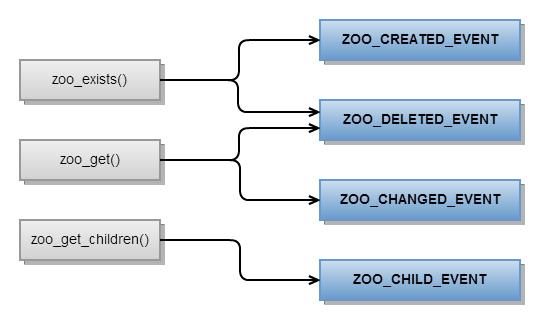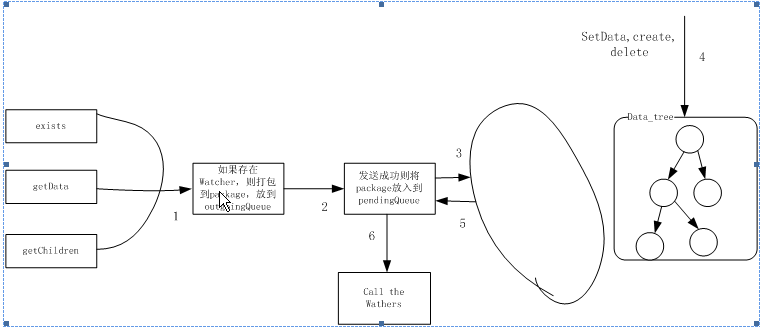zookeeper系列之异步通知模式-Watcher
1 watcher种类和事件种类
1. zookeeper实例化时注入的默认Watcher
2. dataWatchers 一个Map<string Set<Watcher>>数据结构,保存调用getData时 注入的Watcher或者调用exist时 path指定的节点存在
3. existWatchers 一个Map<string Set<Watcher>>数据结构,保存调用exits时对应的path节点不存在条件下注入 的Watcher
4. childWatchers一个Map<string Set<Watcher>>数据结构,保存调用getChildren 时注入的Watcher
默认Watcher主要是处理连接建立成功,连接断了-会重连,SESSION失效-这个需要重新实例zookeeper对象这些事件
其他的三个Watcher都是MAP<String, SET<Watcher>>结构的,MAP中的KEY是zookeeper数据路径,当调用
exists,getData,getChildren函数时会需要传入一个Watcher,对应的path上的数据发生改变时,zookeeper服务器
会发送NOTIFY包给客户端,客户端在收到NOTIFY包后根据包指明的path和事件类别回调有关Watcher的process函数。
所有需要系统的管理这些Watcher,故分成三个MAP来管理这些Watcher。
当调用getData时将注入的Watcher加入到dataWatchers.get(path)的SET里面,调用childWatchers时一样。需要
重点注意的是当调用exists时,如果path不存在则加入到existWatchers.get(path)的SET里面,否则加入到
dataWatchers.get(path)的SET里面,这样做的原因是为了保持和客户端接收到NOTIFY包时处理一致。
Watch事件类型:
ZOO_CREATED_EVENT:节点创建事件,需要watch一个不存在的节点,当节点被创建时触发,此watch通过zoo_exists()设置
ZOO_DELETED_EVENT:节点删除事件,此watch通过zoo_exists()或zoo_get()设置
ZOO_CHANGED_EVENT:节点数据改变事件,此watch通过zoo_exists()或zoo_get()设置
ZOO_CHILD_EVENT:子节点列表改变事件,此watch通过zoo_get_children()或zoo_get_children2()设置
ZOO_SESSION_EVENT:会话失效事件,客户端与服务端断开或重连时触发
ZOO_NOTWATCHING_EVENT:watch移除事件,服务端出于某些原因不再为客户端watch节点时触发
watch事件与zookeeper读操作的对应关系图:
2 watcher api
Watcher是Zookeeper用来实现distribute lock, distribute configure, distribute queue等应用的主要手段。要监控data_tree上的任何节点的变化(节点本身的增加,删除,数据修改,以及孩子的变化)都可以在获取该数据时注册一个Watcher,这有很像Listener模式。一旦该节点数据变化,Follower会发送一个notification response,client收到notification响应,则会查找对应的Watcher并回调他们。 有以下接口可以注册Watcher:
1. Stat exists(final String path, Watcher watcher)
2. Stat exists(String path, boolean watch)
3. void exists(String path, boolean watch, StatCallback cb, Object ctx)
4. void exists(final String path, Watcher watcher, StatCallback cb, Object ctx)
5. byte[] getData(final String path, Watcher watcher, Stat stat)
6. byte[] getData(String path, boolean watch, Stat stat)
7. void getData(final String path, Watcher watcher, DataCallback cb, Object ctx)
8. void getData(String path, boolean watch, DataCallback cb, Object ctx)
9. List<string> getChildren(final String path, Watcher watcher)
10. List<string> getChildren(String path, boolean watch)
11. void getChildren(final String path, Watcher watcher,ChildrenCallback cb, Object ctx)
如果参数需要传递watcher,则可以自己定义Watcher进行回调处理。如果是Boolean型变量,当为true时,则使用系统默认的Watcher,系统默认的Watcher是在zookeeper的构造函数中传递的Watcher。如果Watcher为空或者Boolean变量时为false,则表明不注册Watcher。如果获取数据后不需要关注该数据是否变化,就不需要注册Watcher。上面没有返回值的都是异步调用模式。需要注意的是,一旦Watcher被调用后,将会从map中删除,如果还需要关注数据的变化,需要再次注册。 Watcher原理 要搞清楚Watcher的原理,让我们看看Watcher的工作流程。
Watcher的使用与注意事项
Watcher需要每次都要注册。
并不是Watcher的节点被修改n次,客户端注册就会被通知n次。如果watcher的节点频繁被修改,有可能修改了10次,客户端被通知8次。如果client与server连接状态发生改变,watcher总是会被通知。
3 一个例子
#include <string.h>
#include <errno.h>
#include "zookeeper.h"
static zhandle_t *zh;
/**
* In this example this method gets the cert for your
* environment -- you must provide
*/
char *foo_get_cert_once(char* id) { return 0; }
/** Watcher function -- empty for this example, not something you should
* do in real code */
void watcher(zhandle_t *zzh, int type, int state, const char *path,
void *watcherCtx) {}
int main(int argc, char argv) {
char buffer[512];
char p[2048];
char *cert=0;
char appId[64];
strcpy(appId, "example.foo_test");
cert = foo_get_cert_once(appId);
if(cert!=0) {
fprintf(stderr,
"Certificate for appid [%s] is [%s]\n",appId,cert);
strncpy(p,cert, sizeof(p)-1);
free(cert);
} else {
fprintf(stderr, "Certificate for appid [%s] not found\n",appId);
strcpy(p, "dummy");
}
zoo_set_debug_level(ZOO_LOG_LEVEL_DEBUG);
zh = zookeeper_init("localhost:3181", watcher, 10000, 0, 0, 0);
if (!zh) {
return errno;
}
if(zoo_add_auth(zh,"foo",p,strlen(p),0,0)!=ZOK)
return 2;
struct ACL CREATE_ONLY_ACL[] = {{ZOO_PERM_CREATE, ZOO_AUTH_IDS}};
struct ACL_vector CREATE_ONLY = {1, CREATE_ONLY_ACL};
int rc = zoo_create(zh,"/xyz","value", 5, &CREATE_ONLY, ZOO_EPHEMERAL,
buffer, sizeof(buffer)-1);
/** this operation will fail with a ZNOAUTH error */
int buflen= sizeof(buffer);
struct Stat stat;
rc = zoo_get(zh, "/xyz", 0, buffer, &buflen, &stat);
if (rc) {
fprintf(stderr, "Error %d for %s\n", rc, __LINE__);
}
zookeeper_close(zh);
return 0;
}
转自:http://zoutm.iteye.com/blog/708468

